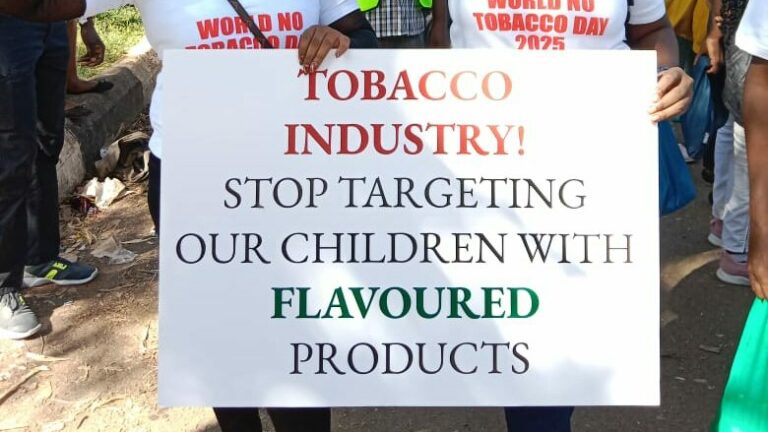Reducing Consumption Among Young People in Kenya
By Whitney Atieno
The writer is a Kamukunji Youth and Tobacco Control Advocate.
NAIROBI | 23 September 2025 (IDN) — Tobacco consumption is a significant public health issue in Kenya, causing approximately 12,000 deaths annually and contributing to various cancers and other non-communicable diseases (NCDs). According to the 2024 Data on Youth and Tobacco in Africa (DaYTA) survey, approximately 244,000 adolescents (2.5%) in Kenya currently use tobacco or nicotine products. Additionally, the survey found that boys had a prevalence of current use of 3.3% compared to 1.8% among girls.
Tobacco use during childhood and adolescence poses a serious public health threat to young people, both for their present and future well-being. The most immediate effect is on health where adolescent smokers often experience respiratory problems. Nicotine addiction also develops rapidly in young people leading to long term dependence. Tobacco use in the long run increases the risk of chronic illnesses such as cancers and heart diseases which usually present in adulthood due to early exposure.
Although Kenya ratified the World Health Organization Framework Convention on Tobacco Control (WHO FCTC) in 2004 and enacted the Tobacco Control Act in 2007, the country has not fully utilized tobacco taxation’s potential to reduce consumption and related diseases. While multiple measures are outlined in the Act, tax increases remain the single most effective tool for quickly reducing tobacco use.
For this reason, taxation is a crucial tool in the effort to attain a tobacco-free Kenya. The Act aligns with WHO Framework Convention on Tobacco Control (FCTC) Article 6, which recommends price and tax measures to reduce the demand for tobacco. The Kenya Tobacco and Nicotine Tax Coalition (KTNTC) has therefore continued to advocate for effective tobacco taxation policies to reduce tobacco and nicotine consumption, thereby decreasing the incidence of tobacco-related diseases in Kenya.
The effects of tobacco tax increases are profound and wide-ranging. Higher taxes raise the retail price of tobacco products and make them less affordable. They are especially effective at reducing smoking rates among vulnerable populations such as youth. Tobacco taxes reduce youth smoking by about 6% and prevent young people from initiating smoking. At the same time, the government would earn additional revenue, which could be reinvested in healthcare to combat cancers, cardiovascular diseases, and other non-communicable diseases.
According to WHO, as of 2024 Kenya’s tax share is between 70%-74% of the retail price of cigarettes, missing a critical opportunity to reduce tobacco use, save lives, and unlock revenue for health financing. Several challenges hinder the full implementation of taxation measures in Kenya. Illicit trade and cigarette smuggling undermine policy gains by introducing untaxed products that are both cheaper and more accessible. Industry interference, often through lobbying and economic arguments, delays necessary reforms. Affordability gaps also remain, as cheaper tobacco brands and rising incomes offset the impact of tax increases.
To overcome these barriers, a uniform specific excise tax applied per cigarette would be simpler, easier to administer, and more effective at raising the price of all brands equally. By setting the new specific tax at a level that pushes the tax share of retail price close to the WHO benchmark of 75 %, the government can discourage consumption while maximising revenue potential. All nicotine and tobacco products should be taxed in proportion to their cigarette-equivalent units. This would reduce substitution and ensure market equity. Investment in stamping, track-and-trace systems, and customs enforcement would help Kenya reduce illicit trade while protecting both revenue and health gains. A portion of the increased tobacco tax revenue could also be ring-fenced to fund cessation programs, primary healthcare, and the prevention of non-communicable diseases.
By addressing these challenges and adopting a comprehensive taxation strategy, Kenya can align fully with WHO recommendations, reduce tobacco consumption, save lives, and secure sustainable revenue for national development. [IDN-InDepthNews]

